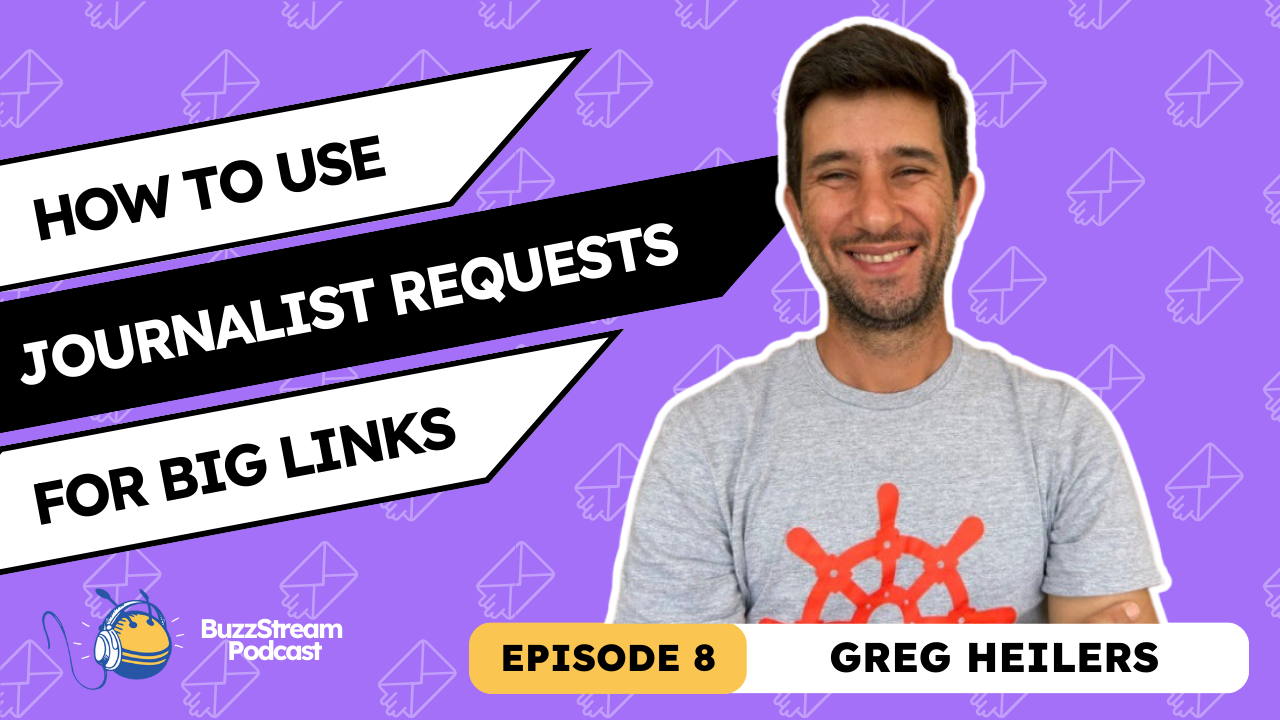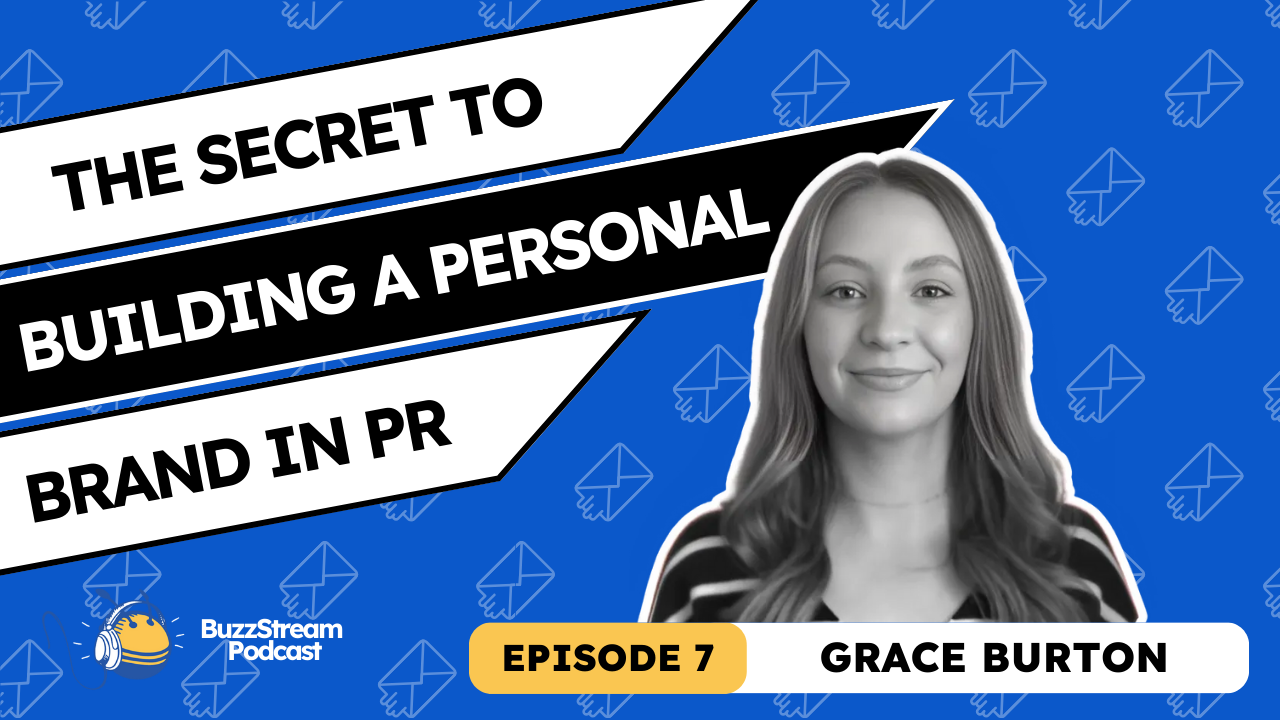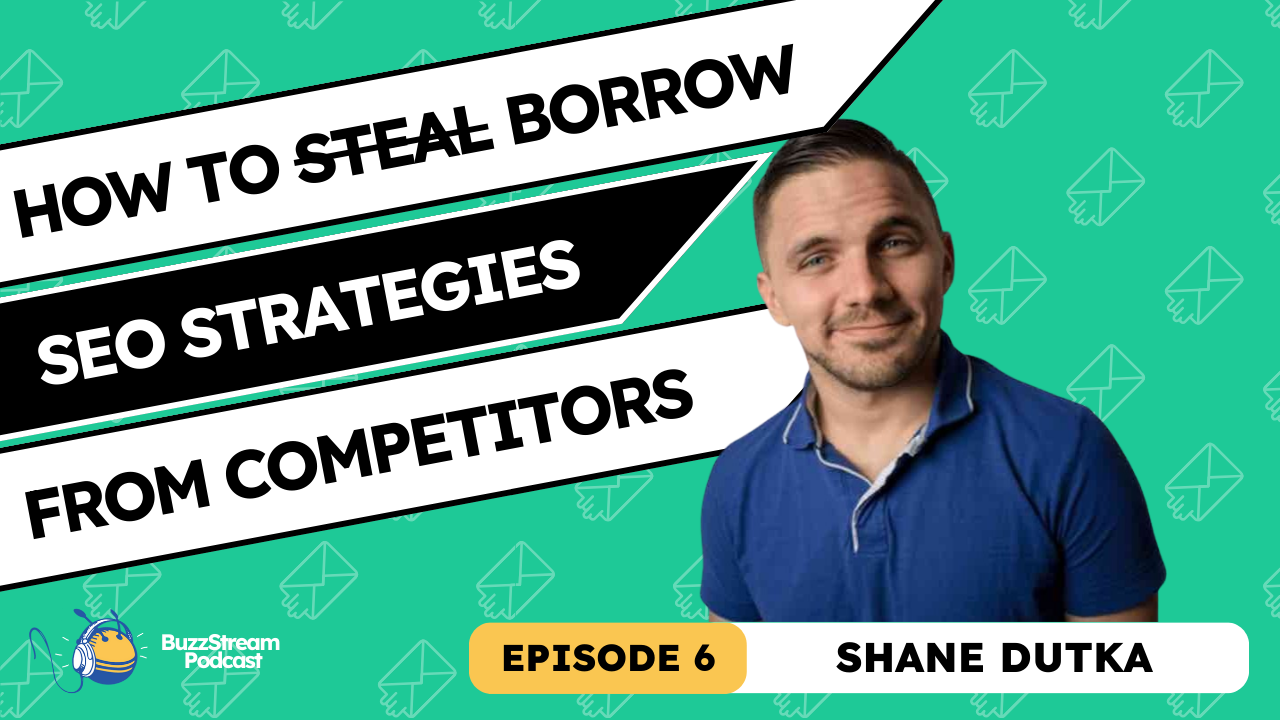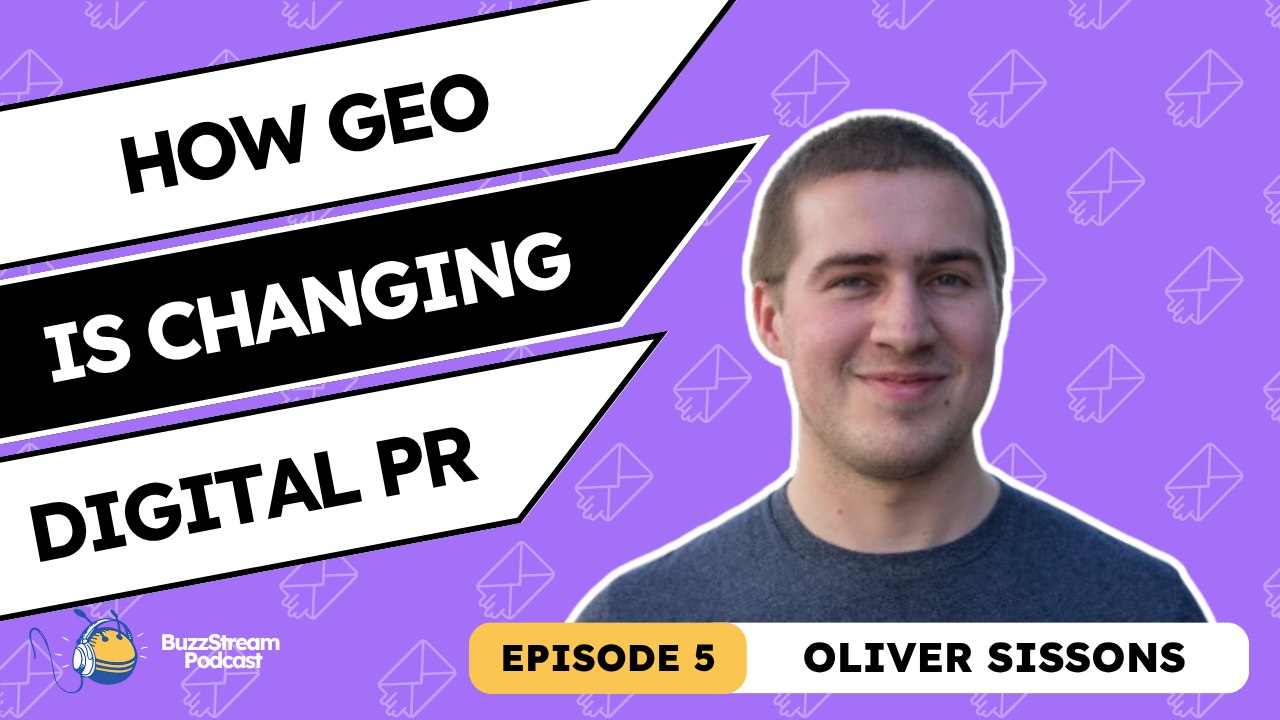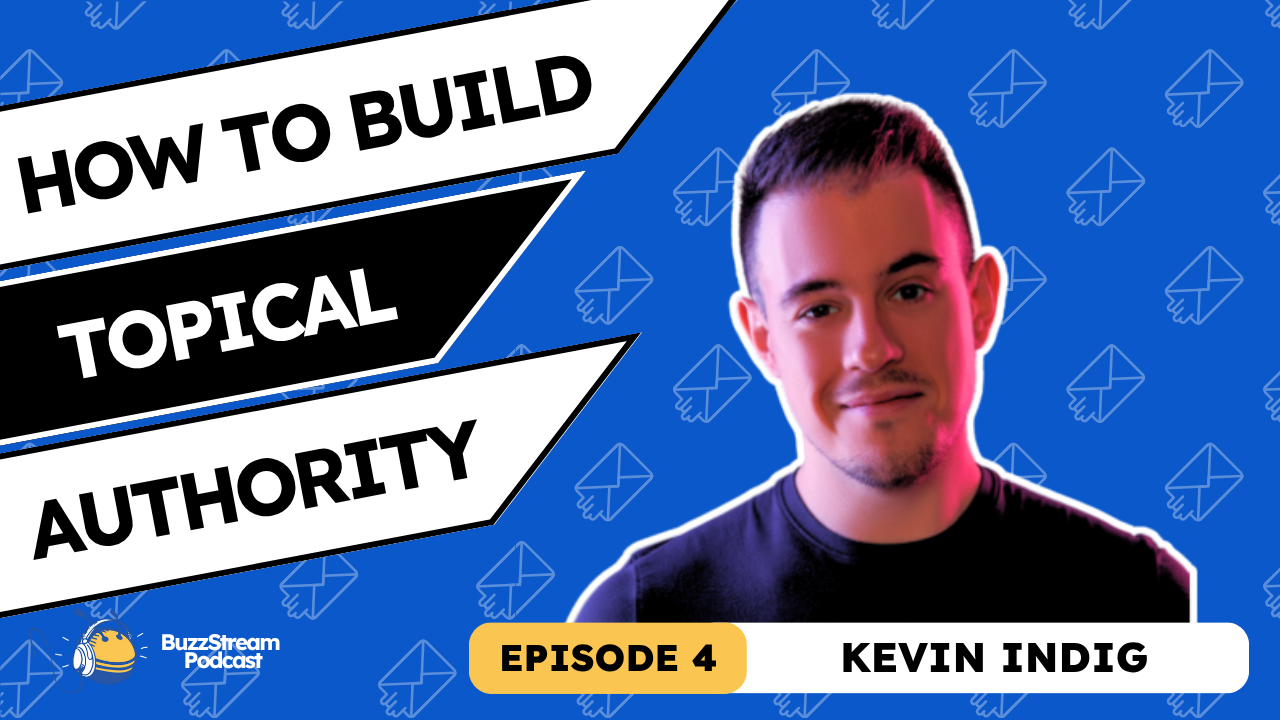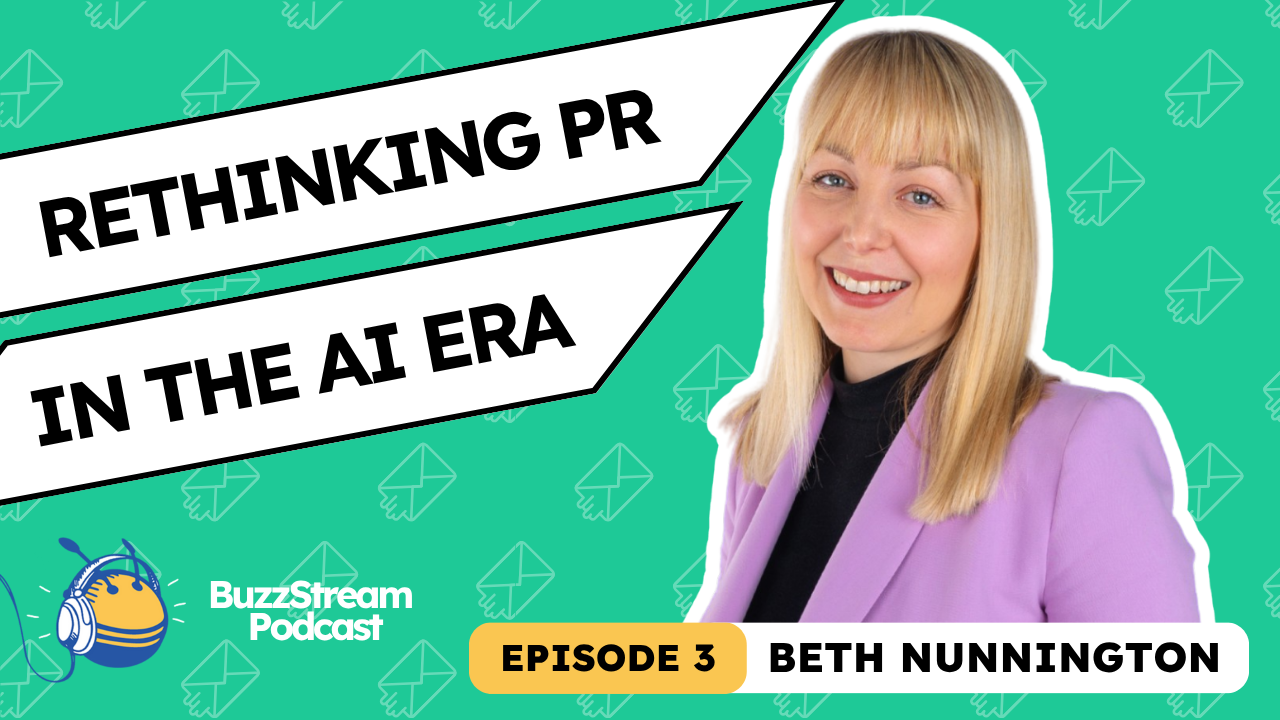Table of Contents
You may know Thea Chippendale from The PR Insider, an invaluable newsletter for PR pros. I recommend checking it out now if you haven’t already done so.
I’ve wanted Thea on the podcast to discuss The PR Insider for a while. Then, after she had posted a thoughtful LinkedIn post about being a freelance PR, I thought it was an excellent opportunity to combine the two into an episode.
In this episode, we divided the discussion into two parts. First, we discussed all things freelance PR: how to get into it, how to avoid bad clients, how to build a community, etc.
Then, we discuss building a successful newsletter like The PR Insider and tips she’s learned from it for her own PR work.
Enjoy!

Resources Mentioned
Here is a list of the resources and campaigns mentioned in the post.
- The PR Insider Newsletter
- LinkedIn post about freelancing
- HBO Intern LinkedIn post
- Notion
- Session
- Design Taxi
- Little Black Book
- Famous Campaigns
- Rise at Seven’s Future Gamer
Transcript
Vince: Hello everyone and welcome to the BuzzStream podcast. My name is Vince Nero and today I am joined by Thea Chippendale Thanks so much for joining us Thea.
Thea: Thank you for having me.
Vince: Yeah, so you all may know Thea from the PR Insider newsletter Which is a great resource for anyone in the PR space. I highly recommend checking it out and subscribing I’ll put a link in the show notes The you have been around in the digital PR space for a bit here.
You were at an agency, you were at a media vision and rise at seven. Then you made the switch to being a freelancer. I want to talk a little bit about that. Cause I saw recently we’re recording this August 9th. Recently you had reached your one year mark as a freelancer. You had some fantastic things to say about it, some learnings.
And I really want to dig into that because I think. People can really take a lot out of this, but before that, some people may know you from Going viral yourself, and I’d love to know a little bit about what it’s like to be on the other side of that a campaign as a, if I could call it that we talked briefly before we started and you said you’ve gone viral more than once that the only one that I know is, this Tinder thing, you were wearing a dress and somebody had some stupid things to say about it.
Can you tell us about going viral?
Thea: Yeah the first time I went viral was just after, I think it was just after I finished university. And yeah, like you said, I’d had this experience on Tinder. I was wearing a dress that I’d just worn to a wedding and this guy made some pretty awful comments about it.
I think he was in the grand scheme of things. I think he was just trying to get a rise out of me, but I took it very personally. So I decided it, I put it on Twitter. At that time, it was when Twitter was used more as a personal thing for me, so it was more just for my friends. I thought, oh, let’s show my friends what’s happened.
And all of a sudden, it blew up, and everybody was retweeting it. Talking about it, and then all of a sudden I was getting journalists in my inbox wanting to talk to me about it, wanting some like exclusive comments from me, and bearing in mind I hadn’t worked in PR before so I didn’t know what all this stuff was happening and what was going to end up like happening and I feel like it just got syndicated across so many different publications.
I was asked to go on the radio, which I’ve never done before, which I still to this day refuse to listen back on because I hate listening back to my voice.
Vince: I never listen to my podcast if I can’t help it.
Thea: So yeah, so that was my first experience of going viral. And it was actually one of the reasons why I ended up working at Rise at 7 because Carrie Rose, who is the CEO and founder of Rise at 7, had put She went viral for talking about my, me going viral, so she’d repost it on her Twitter and went viral again from reposting about the story, because it was basically how I’ve just realized I’ve left out a massive part of it, which was how ASOS responded to it, because it was an ASOS dress, and so ASOS basically saw it, saw that, I just said that it was addressed from ASOS and basically obviously on Tinder, I think, I can’t, I’ve not been on Tinder in ages if you swipe a certain way, then that’s you saying yes to it or something, yes to the person.

And so they put my picture on the second row of the actual product on the ASOS website as like some cool, like PR marketing kind of thing. On top of it, and I think that’s when it went another level of viral because people are like, oh my god, like ASOS responded This is great PR from ASOS. It’s a great campaign and still to this day like I get people asking me about it and people still think It was some kind of PR stunt from ASOS.
People don’t realize that it was my life
So yeah, it was interesting. But yeah, that’s how I ended up actually getting into PR, was going viral.
Vince: Yeah, so it’s gonna be my follow up question. That’s got to be super inspiring to see that roll out and be like, hey, I could probably do this for other people, right?
Thea: Yeah, definitely.
And I remember when I first started at Rise, Carrie and Will, who work there, were like, put the ASOS picture as your email, so when you’re sending it out to journalists. They’ll see your picture and be like, Oh, that’s the ASOS girl. And maybe they’ll put your emails a bit more up.
Can you tell us about the second time you went viral?
Thea: So that was a year ago. And to be fair, it’s not the same level as the ASOS one. But it was more a LinkedIn viral situation. And basically I’d seen. Something had gone wrong with an intern had put something wrong on something. I can’t remember what it fully was. I’m going to have to quickly Google it again.
But basically an intern had done something wrong and everybody responded to it by putting like dear intern and then responded to it saying like something that they basically messed up in their career. And it didn’t really matter in the group. And somehow managed to get, I think it was like, hundreds of thousands of likes.
Vince: I think I remember seeing that, now that you say that. Just randomly, we weren’t connected at the time, for sure. I must have organically come across that.
Thea: Yeah, so it got 200, almost 200, 000 likes. And it was a HBO intern accidentally sent a mass blank email to thousands of subscribers.

And then it was just like a, like how the community came together to show that mistakes don’t make you who you are kind of thing. It’s a, when you’re an intern, you’re growing and yeah, everything like that.
Vince: Yeah. Yeah. That’s awesome. I’m sure there’s so many learnings in just those two things that you can pull into your career as a digital PR, especially a freelance digital PR.
And that’s what I wanted to dig into a little bit here. I think one good thing to establish at the beginning though, is which I’ve realized after going through a couple of podcasts like this is where people delineate traditional PR and digital PR, I know it’s, it seems like it’s getting a little more messy, right?
The crossover between the two, you have your newsletter, the PR insider,
Can you talk briefly about where you draw the line between Digital PR and traditional PR?
Thea: It’s a tough question because I think personally, I think we need to stop seeing them as two different things. Cause I think they can each learn from each other and we can learn different things from each strategy.
So I actually had somebody on the PR insider called. And she talks about what each, like what we can learn from each other, basically what traditional PRs can learn from digital PRs and vice versa, because in the newsletter I’ve started including more traditional campaigns in like creative stunts and everything like that, because I think it is vital that we start to learn from each thing because I think without each other, One of them is going to end up like ceasing to exist or something like that.
So I think traditional PRs should be integrating digital techniques into what they’re doing because otherwise you’re missing out on a whole demographic. And also at the same time, I think digital PRs tend to lose focus on their like relationships with journalists because it’s that like mass produced campaigns that people end up doing.
So I think there’s I think it needs to be less of a a divide between the two and more trying to be a bit of a cohesive PR, rather than Right,
Vince: it’s just PR.
Thea: That’s, so that’s my answer to that.
Vince: Yeah, no, that’s great. Again, I think it’s important to establish that when we first start because then we can speak the same language throughout the rest of these questions.
Let’s get into your life as a freelance PR professional. As I mentioned earlier, you had a great post on LinkedIn where you gave a laundry list of things that you learned and things that you wanted to do more of, and I thought that would be a great post. I’ll link to that post in the podcast notes.
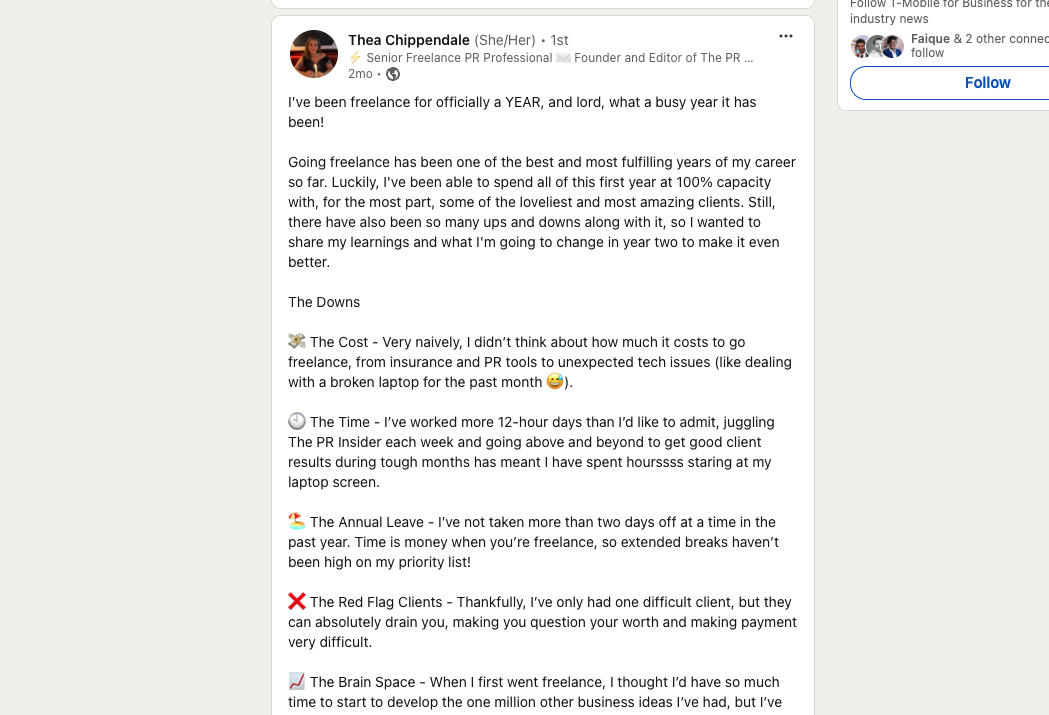
Everybody should check it out.
How would people know when they are ready to become a freelancer?
Thea: So I don’t think it was a decision that I made lightly. Like I was thinking about it for a while and I don’t think anybody should take advice from anybody else because I think it’s definitely a personal thing that you end up going through because it’s something that is quite scary.
There’s a lot of kind of independence that’s like immediately put on you. You don’t have a support network like you used to kind of thing. But for me, I felt like in agencies I was very much limiting myself somehow, like I wasn’t, didn’t have the freedom to work on clients that I wanted to.
I didn’t have the freedom to do different strategies and I didn’t have time to do things like what, create the PRs inside it. If I didn’t go freelance, then I wouldn’t have had that kind of possibility to have the time to put that all together. So I think for me, I just wanted more freedom. And I.
I think the past year has shown me that freedom has allowed me to become an even better PR. Yeah, I don’t know. I think it’s a very personal thing when you make that decision to do it because like I said, there’s a lot, as much as people think there’s so many positives to it, I do think there’s a lot of kind of disadvantages to it and things that are quite tough.
Vince: Yeah, I’m sure like you said, a lot of people come into freelance for a lot of different reasons. You might get laid off and decide where to go next. I remember running to that myself when I decided to leave. And I was like, we were about to have our first child and I wasn’t sure if I wanted to be a freelancer and stay at home dad and all these things that go with that.
It can be a daunting decision to go freelance because like you said you lose a lot of that support network. You lose the health benefits, you lose, all that kind of stuff. Let’s talk a little bit about the support network. You mentioned that in the post, kind of one of the final things, but I thought that was, that really stood out to me.
I work from home. I do miss having that community. We have Slack and stuff, but you mentioned getting together with people and still having a community even though you work freelance. Let’s talk a little bit about that.
Can you talk about building a community even though you work freelance?
Thea: I am very grateful that I’ve made a lot of friends through my like times and agencies, obviously, I feel like agencies, you’ve have that like support bubble there and it’s.
Come with me throughout my career now. So like the people that I made friends with at Rise at Seven are the people who have created their own agencies now. And I get to experience them doing some amazing things and still see them on a regular basis. I’ve got people that I’m still friends with from MediaVision who are based in London.
So whenever I fancy going down to London, I get to go see them. I think there’s like the, my community in terms of. Seeing people on a regular basis is the community that I’ve created with the friends in my previous agencies, but also going to talks doing those kind of networking events, is the way that I’ve created community in person.
But I know that Erica has created this. Slack, I know you said Slack channel and I know it’s not technically something like that’s in person, but Erica created this Slack channel that’s just full of freelancers, PR freelancers and SEO freelancers. And that is definitely been something that has been like, I wouldn’t have been able to do freelance without because it’s literally everybody in there is there.
Just so helpful with each other wants to help. We pretty much everyone talks on a daily basis about like struggles about the industry, about red flag clients, so that everybody is aware if there’s somebody going around that might not be. Too great. And things like that. So yeah, there’s two sides of it really.
I’ve got a really strong network that I’ve created and a really strong freelance network that Erica has managed to create.
Vince: Yeah. Do you recommend people go do networking? Do you go to events and that sort of thing to build that community if you don’t have one?
Do you recommend freelance PRs go to events and network?
Thea: To be fair, I haven’t actually been to an event for the past couple of months I’m probably not going to be the best example here, but I have done things like going to Brighton talking to people that there was an event that JBH did last year that I went to and get them to talk to people. So all of the events, I feel like after COVID people are doing a lot more events now and I think it’s really important, especially for like junior PRs as well, to get out there and network with other people and to listen to the talks, because I feel like you always end up learning something, even if it’s not necessarily.
Something you were looking to learn, if that makes sense.
Vince: Yeah, of course. There’s you never know what you’re gonna pull out from any of these talks, and you might go to a conference or something, not really excited about any of the talks, and then you Yeah, you hear one thing that might make all the difference.
So I totally agree. One of the other things you talked about were some of the costs. You can think of it from the perspective of the actual like monetary costs, but then there’s like time costs. And I know you, you spend a lot of time on the PR Insider. I can’t imagine how much time it goes into it.
I know you have some help at this point too, but let’s talk a little bit about the costs. Let’s talk about. Specifically like monetary costs and how you navigate that.
Can you talk about the monetary costs of being a freelancer?
Thea: Yeah, it’s it definitely I mean I said it in the link LinkedIn post that I think I was very naive in terms of thinking that I could get away with not like buying tools and things Like that obviously I was so used to agencies paying for didn’t even realize how much it would cost but like I’ve been it’s fine like I’ve been able to be really like specific about the things that I wanted And Obviously I get, try and get the most out of each tool that I pay for.
And, but other things, it’s like having to pay for accountants. It’s having to pay for insurance. Like I pay for health insurance, life insurance, business insurance. So there’s a lot of insurances that I pay for. And then obviously, even though, so for example, I put it in my LinkedIn post that throughout July I had a broken laptop.
So it got fixed and then it broke again. And then They couldn’t fix it again. So basically I’ve had to buy a whole new laptop. But obviously there’s not like a boss, like a CEO there that’s yeah, just buy another one kind of thing. It’s me. And thankfully I do have insurance, but it’s still I having to pay in excess and everything like that.
So I think, just yet naively thought that I didn’t have to do these kinds of things, but in fact, but there’s also the thing about obviously like the cost of just having annual leave is a lot, even if it’s not like something that I’m physically paying for, I’m not being paid to go on holiday.
Like you are, if you’re fully employed. So that’s also a cost to me is whenever I want to take annual leave or anything like that is. Yeah.
Vince: Yeah. Let’s talk a little bit about that. How do you plan for taking vacation? Is this something where you can double up on clients? Do you put out one big campaign and go on vacation and hope that it does well?
Like how does that work for you?
How does vacation-planning work?
Thea: So again, I touched upon it in the post. I said, I’ve said that I haven’t really taken off more than a couple of days at a time since I’ve gone freelance. So I’ve not had a full week off. So that has meant that if I was going to take some time off, I could just schedule things in advance.
And it has also meant that I’ve not been switched off when I’ve been on holiday because I still want to be available just in case something like Something goes wrong and I can quickly be there and answer a question. Yeah, I think that’s definitely one of the biggest downfalls of being freelance, but I also don’t think I put in good strategies or boundaries to have that, yeah.
Vince: I feel like that in itself is a skill, is being able to think ahead enough to do all that kind of stuff. I’m learning that myself. So talk a little bit about burnout and I feel like that ties into this Taking time off and how do you recommend people balance that I know you talked about truck, this is a goal of yours So like what are these goals that you’ve set for yourself?
How do you plan to go about battling burnout?
Thea: Thankfully I really love my job and I love doing everything about it. So I don’t feel like I’m at a point yet where I could be burnt out because I enjoy doing it, even if it is like a lot of late nights and weekends and things like that. But I think I definitely want to put boundaries in place so that I can be my best self.
Cause I feel like when you do overstretch yourself a bit, you end up diluting your skills. So I do think that, and to be fair, I don’t actually know what boundaries I’m going to put in place, I just know I need to do them at some point, so that’s probably not going to be the best answer to that question.
But at the start, I definitely don’t think I was very organized with like task management and everything like that, whereas now I’ve found a pretty good like routine of how I manage my day to day tasks and everything like that, so I can be a bit more of, I don’t know, sane.
Vince: Yeah, for sure.
Do you have any specific tools that you recommend that are helpful for freelancers to manage task management?
Thea: So I use a tool called, I think everybody will know what this is, called Notion. I don’t know if it is it. Do you know what that is?
Vince: I do. Yeah. Yeah.
Thea: And then I just used the Kanban method, and basically, on a monthly basis, I will put in all of what I’m expecting tasks to do or like my weekly tasks for pretty much everything for clients, for business for the PR insider, everything like that goes in there.
And then on a weekly basis, I basically put my move everything across and it gives me that kind of serotonin boost when I, I’m very bad at keeping focus on things. So I use a tool called Session which is basically, it’s like a, the Pomodoro method is, and it basically takes every, some people might hate this.
But it ticks in the background for 20 minutes and it keeps my focus onto things then it gives you the opportunity at the end to write notes.
And usually what I write in the notes is like things that might have distracted me during that session.
So then for the next couple then I know what’s like my key factors that day that’s going to distract me and I know to like so and it’s a really good time tracking tool for time that I spend on clients because I’ll just put worked on so and so so then at the end of the month I can look back and be like, oh, yeah, I did that much from that kind of thing.
Vince: Yeah, I’ve struggled with that too. I was just pulling out. I have this actual physical timer that I use. I can and I just plop it on my desk and it buzzes it was you know, like a ten dollar buy or something, but I have found that exact thing where it’s like If something distracts me, I’ll write it down and then I want them outside of my little timed, whatever, 30 minute time block and go back and be like, okay, cause that’s, I feel like you do have to have some of that kind of brain in the PR space.
Cause you, you have to be on top of stuff. Like you’re looking at a piece of content and you’re, for me, I’m writing BuzzStream content. It’s I’m finding examples, and you’re looking at examples all the time, probably for the PR insider. You get inspired and it’s hard to turn that off.
So you just have to find better ways to compartmentalize and what have you, but yeah, I love that. I recommend everybody like keep a separate tab open or something for any cool content that you see and just, bookmarks or something, throw it in there, have a workflow for that sort of thing that you do get distracted by.
Cause yeah, you never know what you’re going to find out here. The timer’s going off now. Okay.
I have a feeling the PR Insider is part of this, but let’s talk a little bit about like how you market yourself. because I feel like when you’re at an agency You do have that kind of cushion if you want to call it or like comfort that like somebody else’s handling the inbound business, right?
And you don’t have to go out and market yourself.
How do you market yourself as a PR?
Thea: Yeah, I am. I think there are loads of different ways that you can market yourself as a PR. I think, I think always the main strategy is just being a good PR and a nice person.
I think you naturally end up getting word of mouth and people recommending you and everything like that.
But I do think things like the social media, the LinkedIn becoming a voice within the industry is also a key factor because I think as soon as. people knew regularly, then they’ll be your first port of call, or sorry, you’ll be their first port of call whenever they’re thinking about that kind of issue that you’ve maybe talked about.
For example, I’ve suddenly had loads of French PR campaigns come to me because I do French PR.
And I think that’s from word of mouth, people talking about it and suggesting me to other people. Yeah, I think there’s a whole different aspect of how to market yourself.
And I don’t know if I’m the best example, because I’ve somehow managed to go viral.
So I feel like people know my name already. Now I’ve got the PR Insider. So I feel like this sounds big headed, and I promise it’s not
Vince: You’re allowed to brag on here.
That’s why you’re the guest. That’s cool!
Thea: But because I’ve got the PR Insider as a PR, I feel like the PR Insider has made me a better PR because I’m more aware of what’s going every week.
So I do feel like maybe people know me a bit more for that because I don’t know. I’m in their inbox each week talking to them.
So yeah, I think there’s loads of different ways people can market themselves. And I think, but I do think the main thing is just being a good PR, being a nice person, and then you end up with all sorts of possibilities.
Vince: Yeah. Talk about being a nice person. Cause I, yeah, I feel like that’s such an important piece of kind of client, like you can look at it as like client management and like business, management, but at the end of the day It’s hard to fake that kind of thing.
But talk a little bit about the benefits of that, that you’ve seen, because I really agree with that, and I think that’s great that you’re bringing that up.
What are the benefits of just being a nice person?
Thea: I don’t know. I just think there’s so much horrible stuff in the world. I think the, what’s the point of being a nasty person?
Vince: I love it.
That’s a great mindset..
Thea: I just I don’t think I ever go out unless somebody’s really wronged me or done something really bad. I don’t think I ever go into any situation assuming the worst of anything so that’s how I’m trying to be just a nice person.
Vince: Yeah so two things came from that for me. So you also talk about red flag clients. In your post and avoiding being better at avoiding red flag clients. And it can be tough to deal with clients who have different expectations or whatever is going on in their business. They’re frustrated, they’re worried, whatever.
And it’s easy to take it out on the agency or the person working. Let’s talk a little bit about those red flag clients, and what are some of the red flags that you can pick up on.
What are client red flags?
Thea: Yeah, I think you just raised a really good point there: People do work in different ways. Even though they might be a red flag to somebody, it’s not necessarily a red flag just because they work in a different way.
I’m very grateful that we have this freelance community where people can warn each other if something if somebody has been quite horrible or anything like that, then it usually gets posted and so that Slack channel just warn other PRs that they don’t go down and have to suffer the same path.
But for me, I did say in that post that I’m very grateful that I’ve just had really lovely people that I’ve worked with over the past year—minus one specific example.
I think you can tell when somebody’s communication, the whole PR campaign, and everything else is a bit chaotic. It’s all a bit disjointed, and you’ve got that gut feeling that things aren’t as quiet as they seem.
Then you start to get those feelings of a bit of a red flag, especially when it comes to payment, when they’re a bit iffy on that and everything like that. Then you can tell when somebody’s turning into a bit of a red flag.
Vince: Yeah. Yeah. It’s stressing me out just thinking about it because I’ve been in those situations before. So it sounds like it’s typically earlier on. Are there onboarding tips that you have to pick out some of those?
What do you, what’s your plan for avoiding those?
Thea: To be fair. When a client doesn’t send over a contract, that’s sometimes a red flag, sometimes not because I’ve had some really lovely people who don’t have that in place as an agency, but when we don’t have a process in place for an onboarding, then that’s usually a bit of a red flag.
Cause then that shows me that they’re not very organized internally, but then I Some people might not just be used to working with freelancers, they might not have that process in place. So yeah, I feel like sometimes there’s not a way to pick out the red flags. ’cause the red flags can come if you haven’t been able to get results that you thought you were gonna able going to be able to get.
And then that sort of brings out some red flags of the way that they handle that. So it’s so hard and different of how to actually spot those kind of things. You can be like. 95 percent way through a contract and only just realize it. So yeah, it’s a difficult one.
Vince: Yeah let’s talk about the kind of flip side of that and you mentioned this earlier in one of your responses about Being able to work with clients that you really love and want to work with and that being a benefit of you know Being freelance.
How do you get those clients that you want to work with?
Thea: I’m very grateful that one of my main clients is one that I’ve worked with since I started and that just came from my initial freelance, going freelance post, and then they messaged me and then I’ve worked for them ever since. That’s the way that I’ve been able to find them, just because I’ve worked with them for so long now that it’s just a great relationship that we have.
Yeah, I don’t, that’s it. I don’t really know what else to say. I wish I could just choose all of the good clients, but it’s really
Vince: Yeah, that’s fine. Another thing I just thought of too, what I meant to ask, talking about the Redfly clients is, and this kind of loops into what you just said, it’s like, if you do have that one client, that like main client that is maybe 50 percent of your income And it’s, it starts to turn sour, right?
Like it starts to be not a great client. You’re starting to see those red flags. It can be tough to. Dump a client who makes up 50 percent of your budget, it sounds like you haven’t maybe had that sort of thing But like how would you navigate something like that? How do you recommend people navigate something like that?
Thea: i’m going to be honest i’m probably not going to be the best person to answer that because i’m not very good at confrontation. I really don’t know. I I’m very grateful that I’ve not had to do anything like that yet, but I think honesty is always the way forward, and making sure that you’re honest as to the reasons why it might not be working and, Ask for honesty as well, like why it could have ended that way.
I think it’s always good to get feedback, even if you’re at the point where you want to get rid of them. I think asking for that feedback is always important as well.
Vince: That totally makes sense. Being able to communicate. It sounds like communication is a key skill as a freelancer.
What other skills do you recommend people need as freelance digital PR?
Thea: Like you said, communication is probably one of the biggest ones, because you, a, Client is relying on you, somebody that they’ve not actually really hired themselves. You’re not you’re a bit of a wild card for them really. You’re typically paying, being paid, maybe a bit more money than what they would usually pay another PR kind of thing in the space.
Scale of things. You are a bit of a wildcard, so having that communication I think is really key, letting them know what you’re up to, letting them know any struggles you might be going through with the outreach or anything like that. I know that I typically send across the journalists that I’ve been going out to, the like, open rate that, Been getting any key opens from journalists, things like that.
It’s like a general weekly update to a lot of my clients. Just so that they know what, what’s happening and everything like that. Yeah, so I think communication is one of the really key points as a freelancer. Some other things I think is definitely a time management. That is something that I’ve obviously, as I’ve said at the start, I’m not very good at until I’ve got into this routine of using that Pomodoro technique and like this.
Kanban method and everything like that. But I think it’s really important to have those, that’s the way that you can create those boundaries of not overworking and making sure that you’re not like over servicing clients and everything like that. And I think maybe confidence and having the guts to do it is is amazing all in one.
But yeah, having the confidence to just go out there and talk to people. I think a lot of people are scared to do it because they don’t think they’ll be able to do all the new business kind of thing, but I really think that everybody’s just there to help each other and it’s not as scary as it seems, if that makes sense.
Vince: Yeah, that’s very inspiring, and I have seen a lot of that same stuff, and it sounds even what you’re saying about not being as organized, or what, great at time management, it’s that you can learn it, right? Don’t think that any of this stuff is out of reach, as long as you have the will to do it, you can learn it, the business part of things, you can learn it, that, yeah so if it’s something you want to do, and I recommend people connect with you on LinkedIn and X, and like I said, I’ll put it in the show notes, but.
I’m sure you’d be happy to answer questions and that’s how we build a community, right? So let’s get a little bit into the PR Insider. You mentioned this earlier that was one of the great things about being freelance is that you could start this PR Insider newsletter.
What was the kind of catalyst for starting The PR Insider newsletter?
Thea: There’s a lot of different factors that kind of led me to do it. The whole reason why I started it was because there’s a, another girl called Sophie Miller who does the Pretty Little Marketer on LinkedIn. And she was basically doing these roundups for marketing each week. And I saw them and I started doing little like weekly LinkedIn posts.
And then I think it was somebody commented saying Is this part of a new or, it was either like, is this part of a newsletter, or would you do this as a newsletter? And then I started to think about it a bit more, and I was like, oh, do you know what, it would actually Be quite nice as a newsletter.
Like I would enjoy having something like that in my inbox on a weekly basis to see what’s going on. And then I also felt that in the PR resources and news, like PR week, ad age, all those kinds of like creative platforms, all of them are behind paywall. So you can’t actually. Do it as a regular user as a somebody who might just be starting off in the industry.
They can’t access these kinds of things. Whereas obviously my resource is a free resource. I’ve got the whole campaign list that people can go through and see like how to do it. Sorry, use it for like brainstorms and everything like that. So I basically wanted to create something that was a free resource that was updated on a regular basis that anybody could use.
It’s from, I said it within again, I LinkedIn post, but in the LinkedIn post that I wanted, I want the PR insider to be something that everybody can use from like somebody that’s still in uni doing a PR degree to a head of PR role. PR director I want it to be a community, a resource, everything like that.
Vince: Yeah, and you mentioned this too for you, if you were receiving the PR newsletter, just to give people who aren’t familiar with it what is the most useful piece for you?
What is the most valuable part of the PR Insider for readers?
Thea: Oh, that’s really hard because I like all of them. I put into the newsletter everything that I think I would value as a PR.
So I’m hoping that other people find value in it. So there’s loads of different sections within the PR Insider. So the first section is basically I have a tool that looks at the most talked about topics within the UK publications. And then I basically list out. How many articles have been talked about for each of those things and I can’t remember who it was who said it but somebody basically commented on that aspect of the newsletter was like it’s quite good sometimes to get out of your bubble because When you work on specific clients, you tend to only think about certain topics and certain like articles Whereas looking at that you can see the wide aspect of what could be happening within the health industry What could be happening?
Thoughts and everything like that.
So I like to think of that as like an expansion for people, like people can look at it and think, oh that’s been happening this week, that’s been happening this week, and I don’t know, maybe spur on some extra ideas for the week after. And then the next section is where I basically list, it’s usually around 75 campaigns and Me and Grace basically divide it between reactive PR, thought leadership PR, data led PR, and then creative and campaign PR.
So you can basically scroll through it and see all the different types of campaigns that have happened that week, who’s done it, and where we found it.
Vince: Grace, this is Grace Burton, right? From Digital Loft?
Thea: Yeah.
Vince: Just want to give her a shout out.
Thea: Yeah. Massive shout out to Grace. Grace has been like my absolute life saviour with this.
I think I told her when We first started doing it together, but it was getting to a point where I was literally up until about 2am on a Thursday night putting it together, whereas now she’s alleviated a bit of the anxiety and the putting it all together. So yeah, she is 100 percent being my my saviour with the PR Insider.
Vince: Yeah, so then you have a section with the major events, right? This is donut day and whatever the Olympics are starting.
How can readers utilize the events section?
Thea: Yeah, so The what to look out for next week. So that again was the section just in case anybody had Wanted any quick reactives. I know that a lot of PRs tend to Do their planning in maybe like a four week basis but sometimes it’s nice to just see some something that might be catch your eye and you think, Oh, actually, I forgot about that.
I might do something, put something together for my client next week. We usually, every week we get a PR expert on the newsletter as well, and they pick out their favorite campaign from the week and they talk about why that is their favorite campaign.
And then they usually answer like a I think it’s really important to have a question about either their expertise or something that’s going on within the PR community and give their opinion on it, which is, again, I think it’s one of those things where you can PRs can see somebody else’s opinion, I feel like in agencies settings, you tend to just be surrounded by what your fellow colleagues think and everything like that, whereas seeing somebody else’s advice and expertise and everything like that is always really useful.
Vince: Yeah, for sure. It gets back to that kind of community building you’re talking about That’s where you find that kind of stuff. Where do you find all of your inspiration and these campaigns? Do you have set sites that you look at or do people send you things? I think you do have a submit your campaign button right on the website.
How do you find digital PR campaigns to highlight in the newsletter?
Thea: Yeah. So yeah, there’s a lot. Loads of different ways. I mean I wish more people use the submit button. We probably get maybe two or three that get sent through that a week. And then people also send their press releases across to me which are amazing because I love to see what people are pushing out and everything like that.
Yeah, we get a couple of those a week, but a lot of it is just manual labor from Grace and me putting it together. I would say a lot of my Key publications are a lot of us publications that I look through. So for creative, campaign, and product, I usually go to Design Taxi, which I feel like a lot of people don’t see a lot of people talking about on a regular basis.
Yeah.
Vince: I used to pitch them all the time!
Thea: I usually go on Little Black Book. And I think that is a one where people self submit their campaigns and it’s usually from creative agencies. So that’s more like those big out of office campaigns and everything like that.
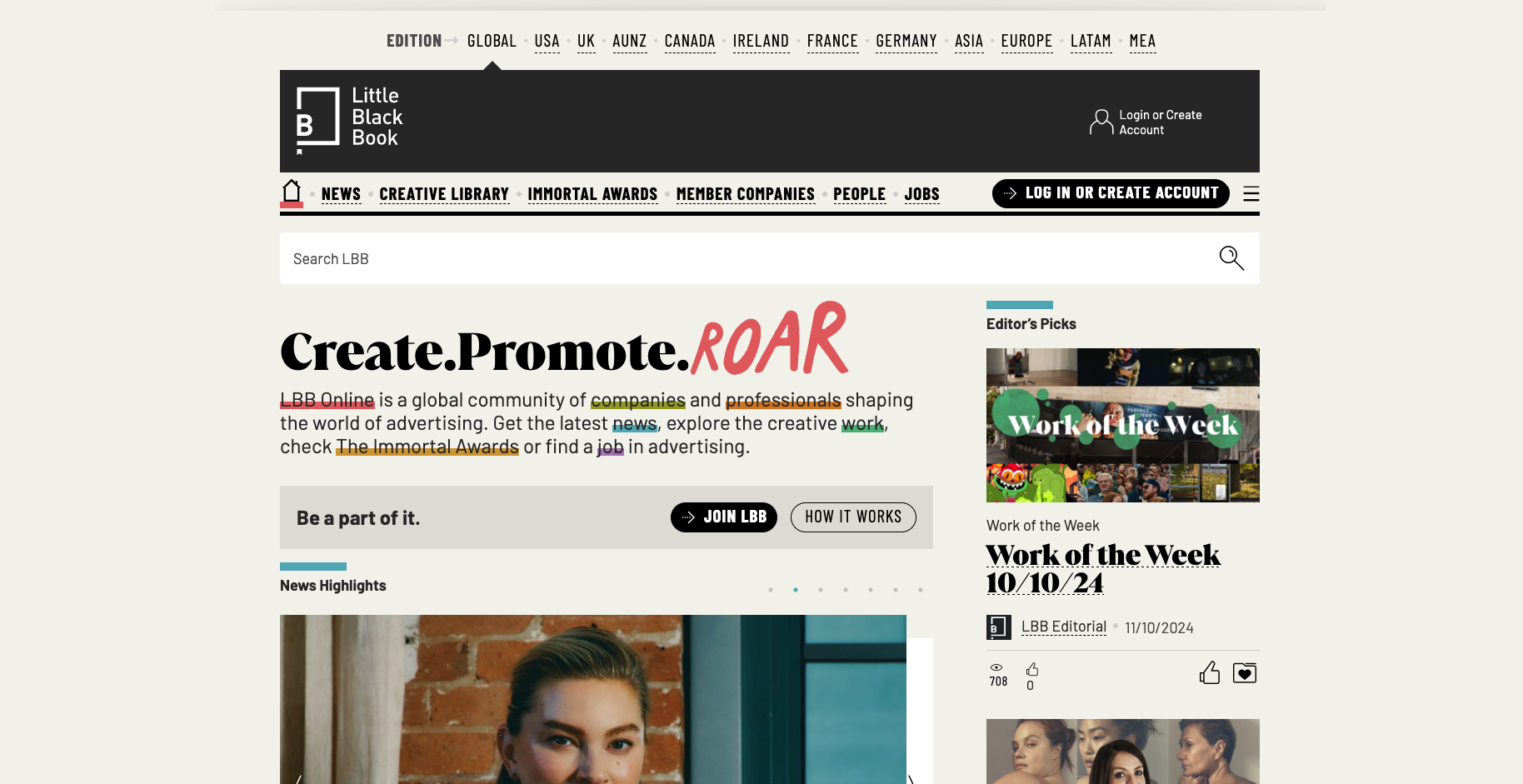
Then I go on to people. com a lot. They usually cover quite a lot of interesting, funny lifestyle kind of stories. And then there’s a lot of food brands do big campaigns on like a weekly basis. So I usually go to Delish, Eat This, Not That, Food and Wine. They always have some fab campaigns that I take from there.
And then Famous Campaigns is always going to be a good one to go to.
Do you have any favorite all-time campaigns that you’ve come across?
Thea: So I did think about this before and I don’t think I can put my finger on one specific campaign but I will tell you that the brands that I love the most that come out with the best campaigns are Crocs.
I feel like, although Crocs have died down with their, they were doing so many like really funny, amazing collaborations and then they’re not really doing. As many anymore or maybe just not ones that have been talked about a lot.
Vince: Thea is calling you out crocs! Let’s go!
Thea: Airbnb are smashing it at the moment I feel like they keep doing the same things in terms of like they’re just recreating like fun houses and everything like that, but I feel
Vince: like I just saw today was the poly pocket one
Thea: Yeah last week was really betty like the week before that was like the up house like I think You It’s such a, it’s not a simple campaign because obviously it’s not simple to execute but I think it’s something that everyone’s going to talk about because it’s something that everybody can relate to personally Polly Pocket is nostalgia.
The Up thing was like incredible because it had all those like balloons on everything like that so each aspect that they’re putting together is something that’s going to make people want to talk about it, which I just love. I think it’s amazing. So yeah, I think those two are probably like my favorite, the ones that I try to find things each week what they could be doing is the ones I’m always checking.
Vince: Yeah. I wrote about this on LinkedIn yesterday. Cause I’ve been really trying to push content creation, ideation, thought leadership, but one of the things that I feel like a lot of agencies and digital PRs have trouble with is finding a creative campaign that they like. And then translating that into something that works for their clients.
Being someone who’s been around and seen so many great campaigns, how do you recommend people extract the seed of those ideas to use on their own clients?
How do you recommend people use other ideas for their clients?
Thea: So the thing that I think is always a key element to anything that goes viral is the emotional element, the element that makes people feel something.
So just thinking about like the time when I went viral, like it made people angry because people were angry at the fact that somebody had said something about somebody else’s like clothes. So it got people to share it because they were angry. They wanted to put their like comments on it.
And it’s the same for, I did a campaign once when I was at Rise of Seven called the Future Gamer. And that really annoyed loads of gamers. So all the gamers did was share it and comment on it, dislike it, everything like that. So they were actively engaged in it. They were feeling an emotion so they were actively engaging it more, which created that sort of landslide of, Virality, if that’s even a word, of just people wanting to talk about it more and more.
So I think if you can think of something that is going to engage different emotions, whether that’s love, hate, makes people sad, anything like that. I think that’s very obvious, but I think just thinking the way that people would react to it is always going to be that kind of like end goal. It’s always going to be the way that you get something to go viral, get something to, yeah, go across all the publications.
Vince: Yeah, that’s great advice. I definitely agree with you. And that’s been my biggest learning, I think, as a PR as well, is the emotion is what really sells the story, especially these days. It’s I feel like, you can only get so far with informational data led stuff. It has to have some type of, or the ones that really do well is it can be a data led one, but it also has that little emotional hook.
Thea: Yep. Yeah, people love to share things that make them happy. Angry or love it or anything like that. Like it’s when people do, I think when people do data led things that is like maybe on a regional basis and then they pit the regions against each other. I feel like that always works really well because they’re putting that emotion within it.
They’re putting that, like the anger against each other and everything like that. Yeah, so I think emotion is a massive part of PR.
Vince: Yeah, totally agree. Thea, I want to thank you so much for joining us today. I want to give a quick rundown. So the PR insider. com is where you can find the newsletter and subscribe, hit the submit button there as well.
Submit your campaigns. If you’re listening to this, cause Thea is going to check them. I’m sure like will look at all of them and it’s a great way to get some exposure.
Follow Thea online it’s just at Theatre Chippendale for X, and she’s also active on LinkedIn.
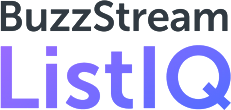
 End-to-end outreach workflow
End-to-end outreach workflow


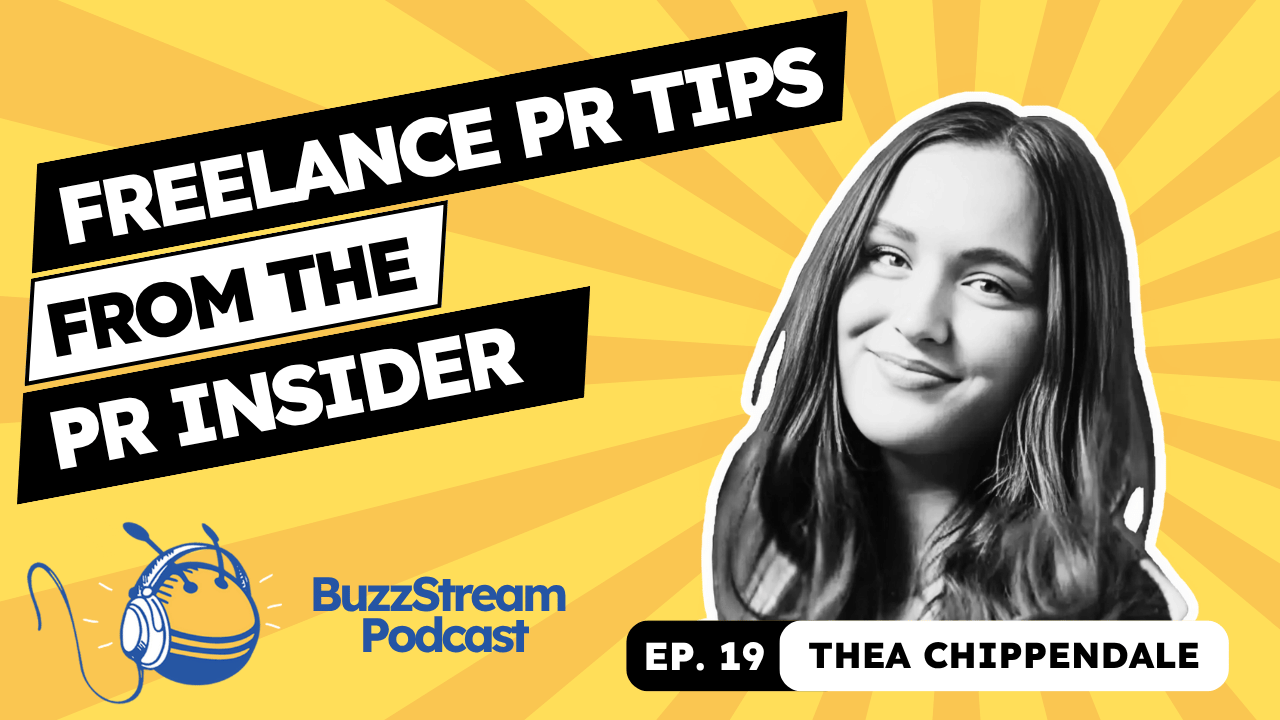
 Check out the BuzzStream Podcast
Check out the BuzzStream Podcast

